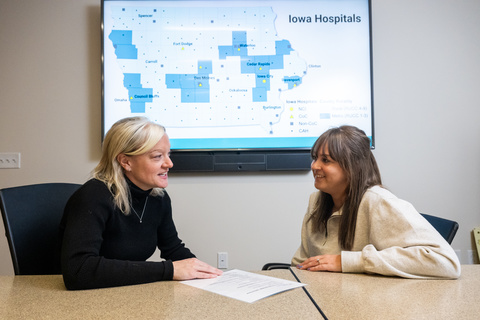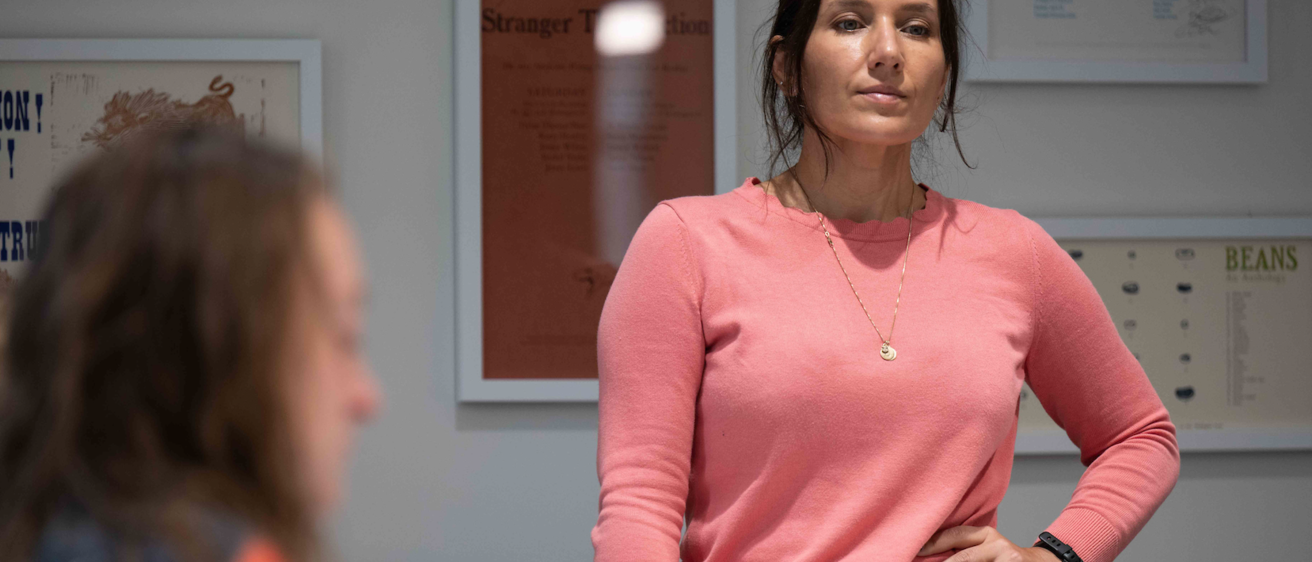Supporting faculty has always been a priority at the University of Iowa, but a recently established award further emphasizes those efforts by providing a platform to elevate the work of talented mid-career faculty.
The Iowa Mid-Career Faculty Scholar Award was created in 2022 to support outstanding tenured associate professors who are exceptional teachers and leaders in and out of the classroom. Awardees receive funding—$25,000 per year for three years—to support their work, along with mentorship to further guide their careers. Each cohort of awardees participates in development activities together over their three-year funding cycle.
This year’s recipients will be announced April 18, two weeks before the five awardees from the first-ever cohort give a presentation at the inaugural Iowa Mid-Career Faculty Scholar Symposium on May 2.
Two of the previous awardees who will present at the symposium—Mary Charlton, professor in the College of Public Health Department of Epidemiology and principal investigator for the Iowa Cancer Registry, and Melissa Febos, professor in the Nonfiction Writing Program and the Department of English—can attest to how the award benefited their work.

Charlton has been part of Iowa since she was a student, receiving a bachelor’s degree, master’s degree, and PhD from the university before being hired as a faculty member in 2010. She credits her experience at Iowa for igniting her passion for research in cancer and epidemiology, which is the study of how diseases, injuries, and other health-related events spread throughout communities.
“I think the University of Iowa was really the perfect place for what I wanted to do,” Charlton says. “Having the Iowa Cancer Registry housed here at the College of Public Health is an amazing resource. We can do data collection and recruit subjects or patients through the patient registry. We can do the whole spectrum of cancer research, which is amazing.”
Febos came to Iowa from New York City in 2020 with her wife, Donika Kelly, who also teaches creative writing at the university.
“We came here mostly because we wanted to work with these Iowa students, and it’s been wonderful,” she says. “I adore my students. I learn so much from them, and I feel it’s a very reciprocal learning experience. I’m in awe of my colleagues in my program, department, and the university at large. People here are doing such fascinating, useful work.”
When Febos arrived at Iowa, she was on the cusp of publishing her third book, Girlhood, and has since published her fourth, Body Work. Both are works of nonfiction, primarily what Febos teaches and publishes.
“In the Nonfiction Writing Program, we have an array of artists who work in all forms of nonfiction,” she says. “It’s fun working with students who are obsessed by exactly the kinds of work I am. For me, nonfiction has this miraculous side effect of making any experience, no matter how difficult, painful or involuntary, useful to me on the other side when I’m making art about it.”
Charlton says being named a faculty scholar has been hugely beneficial for her.
“It’s my perception that when you get to the associate professor level, people think you’re doing fine, and you can be on your own,” she says. “Instead, you have a whole different set of challenges and opportunities. This award came at a really great time for me. It was a huge boost to how I felt about the university and made me automatically feel like part of the university. Coming off the pandemic, that was even harder to do, so it was great to be part of that cohort.”
Both Charlton and Febos say they appreciate the ability to make deeper connections with people across campus, including President Barbara Wilson and Executive Vice President and Provost Kevin Kregel.
“It’s been wonderful to connect with the other scholars and hear about work other folks are doing at the university, and being able to build relationships, including with the president,” Febos says. “As faculty, we can be heads-down and focused on our work, but here we can build relationships across different disciplines.”
Febos says the Iowa Mid-Career Faculty Scholar Award also helped fund the research for her upcoming book, The Dry Season, which explores her personal relationship with independence and solitude and the experience of celibate women across history.
“With this award, I was able to travel to Europe to do my research,” she says. “I was able to hire a graduate research assistant. It was an incredibly fruitful experience. I’m just finishing the book now, and I can’t imagine doing it without the fellowship.”
Charlton says she used resources from the award to help pay for a postdoc position to assist with her research. She also says the coaching sessions have been helpful in figuring out what she hopes to achieve next in her career, and leadership development sessions have helped her become a more effective leader.
“The biggest thing for me is I feel like we’re making a difference here,” she says of Iowa and her work. “That’s what gets me out of bed in the morning.”
